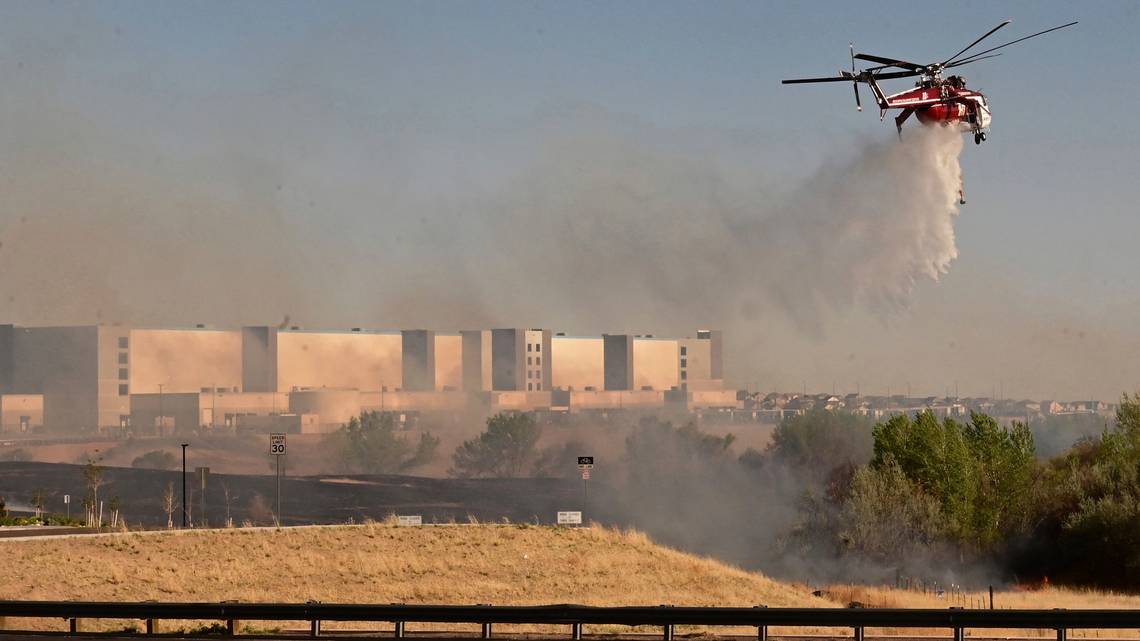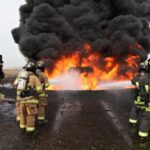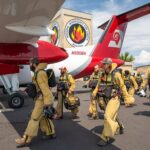
FILE - A helicopter drops water on flames from the Alturas Fire across Powers Blvd. from the Amazon Distribution Center on Thursday, May 12, 2022. A bill introduced in the Colorado legislature would create a $2 million pilot program to use cameras, likely with AI technology, in high-risk locations to help identify fires before they burn out of control. (Jerilee Bennett/The Gazette via AP, File) JERILEE BENNETT AP Read more at: https://www.modbee.com/news/nation-world/national/article271678832.html#storylink=cpy
BY JESSE BEDAYN ASSOCIATED PRESS/REPORT FOR AMERICA
A year after the most destructive wildfire in the state’s history scorched nearly 1,100 homes, Colorado lawmakers are considering joining other Western states by adopting artificial intelligence in the hopes of detecting blazes before they burn out of control. A Colorado Senate committee on Thursday unanimously voted to move forward a bill to create a $2 million pilot program that would station cameras on mountaintops, and use artificial intelligence to monitor the footage and help detect early signs of a wildfire. The bill will move to the state Senate Appropriations Committee next. “It can detect just a wisp of smoke and it’s that type of situation in remote areas that could save forests and homes and properties and lives,” Democratic state Sen. Joann Ginal, one of the bill’s sponsors, said in the hearing.
The deployment of AI is part of an ongoing effort by firefighters to use new technology to become smarter about how they prepare and better position their resources. Fire lookout towers once staffed by humans have largely been replaced by cameras in remote areas, many of them in high-definition and armed with artificial intelligence to discern a smoke plume from morning fog. There are hundreds of such cameras scattered across California, Nevada, Oregon and a handful already in Colorado that allow even casual viewers to remotely watch.
Vaughn Jones, who heads wildland fire management for Colorado’s fire prevention agency, said the technology “allows us to take very aggressive early action and keep the impact down… not waiting until the end of the day to start playing catch-up.” A historic drought and recent heat waves tied to climate change have made wildfires harder to fight in the American West and scientists say warming weather will continue to make fires more frequent and destructive. Record-breaking storms that drenched California with more than 11 inches (27.94 centimeters) of rain in recent weeks and big snow dumps in other states have improved conditions in the short-term, but the drought persists across many western states, according to a Tuesday report from the National Oceanic and Atmospheric Administration.
The Colorado program would support 40 fixed camera stations and six more mobile stations that can be moved to monitor ongoing fires, Ben Miller, the director at the Center of Excellence, which researches technology for firefighting, said at Thursday’s hearing. The AI algorithm behind the camera would try to detect a plume of smoke and alert first responders early, said Miller, who pointed to a structure fire caught by AI technology near the city of Boulder in December as an example. Boulder County had partnered with an AI wildfire detection company called Pano AI, and the software had alerted authorities of the fire around the time the first 911 call arrived, Miller said. One home was destroyed and another damaged before the fire was contained — a far better outcome than a year before when the Marshal Fire, also near Boulder, burned over 1,000 structures.
“The more you train the model, the better and better it gets,” said Miller, who added that his agency is very interested in the technology but that it’s still burgeoning and that a pilot program is a good place to start. Pano AI began working with cities, including the ski resort town of Aspen, Colorado, and has expanded to cities, counties and even Pacific Gas & Electric in six states. Kathryn Williams, Pano AI’s director of government development who testified at the hearing, said “AI machine learning is new, it’s exciting, it’s glamorous but it isn’t perfect,” adding that the company uses employees to vet alerts from the AI. Their stations include two cameras mounted on a high vantage point, rotating at 360 degrees with 10-mile (about 16-kilometer) radiuses and connected to the company’s AI software. Each station costs roughly $50,000 every year. It’s unknown whether the company would be hired for the pilot if the bill passes.
Arvind Satyam, the chief commercial officer at Pano AI, said in an interview that the artificial intelligence uses a data set of over 300 million images that teaches it what is smoke billowing up from a fire and what isn’t. Once a camera signals that there could be a fire, the photos and information are run through the company’s intelligence center for human vetting — the algorithm could’ve mistaken a tractor’s dust cloud for smoke — before it’s sent along to fire agencies, he said. Satyam added that the benefits go beyond detection, allowing fire agencies to pinpoint a blaze’s location and monitor a live feed of the burn. AI has gained notoriety for breaking into a number of fields — from creating propaganda and disinformation to writing essays or cover letters about whatever the user requests. David Blankinship, senior technology advisor for the Western Fire Chiefs Association, said in an interview that fire agencies have come to rely on this type of detection technology, especially in California where the programs have been put to wider use. Still, Blankinship noted that “these cameras, even with AI, are only one component of the actual solution that is working.” When a vote was called to send the bill forward, committee member Republican state Sen. Rod Pelton was enthusiastic. “I do not want to be the bucket of water on this bill so I will be a fiery, ‘Yes’,” he said.
Jesse Bedayn is a corps member for the Associated Press/Report for America Statehouse News Initiative. Report for America is a nonprofit national service program that places journalists in local newsrooms to report on undercovered issues.
Read more at: https://www.modbee.com/news/nation-world/national/article271678832.html#storylink=cpy









